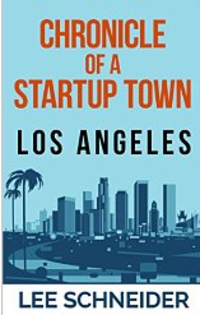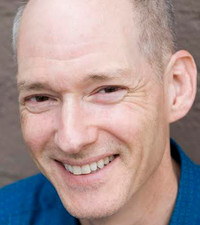Wednesday, June 10, 2015
Lee Schneider: How Los Angeles Became A Startup Town

Lee Schneider is the author of a new book, Chronicle of a Startup Town: Los Angeles, which delves into the people and reasons on why Los Angeles has become one of the epicenters of the startup and technology industry. The book--which was just published last month--profiles the major players, startups, venture capitalists, and others here, in an attempt to understand how and why Los Angeles has become a major force in startups. We caught up with Lee to hear more about the book and what he learned.
Tell us a little bit about your new book?

Lee Schneider: I'm profiling the major players, startups, venture capitalists, and others here to get my arms around what the startup ecosystem looks like in Los Angeles.
Why did you decide to write the book?
Lee Schneider: I saw something very interesting starting to happen here, which brought a new focus to the region that I haven't seen in awhile. I came here originally to write screenplays, a long time ago, in 1988, and saw the indie film movement as it was burgeoning, and saw a lot of excitement in Los Angeles. I hadn't seen that same kind of excitement here again until now. There's an amazing energy and focus going on here. I really wanted to make a documentary, but in book form, interviewing the key players, and letting them do the talking. That's really what got me interested in this--the tremendous amount of energy and focus I saw, which wasn't here in LA until recently.
What was the biggest surprise you found here in the tech ecosystem?
Lee Schneider: That's an interesting question. I think people are starting to see how the talent pool is improving, and getting deeper. There's a tremendous amount of diversity here culturally. It's no so much of the bubble as you might hear Silicon Valley described as having. Silicon Valley is a bubble, culturally, and small geographically but also conceptually. I am seeing here, how LA has a lot more depth. We have this bad rap as a shallow place, but you're even seeing now from people in New York who have recognized that's not the case anymore. There's a lot more depth here than previously has been perceived. The acknowledgement of that has been very interesting to me.
What about it is broader than Silicon Valley?
Lee Schneider: The reason is we have a lot of cultural diversity here. It's not only in the type of people who come to town to try to make it here, but historically. We have aerospace, we have medical technology, and of course we have media communications. There's actually a pretty big menu of people here already, from different industries, who have startups that have sprouted up to serve those industries. That's different than Silicon Valley, which has its own number of industries, mostly software and technology driven, which those startups serve. That ends up being a small piece of the puzzle. Here in LA, there is a lot more diversity, and we're more spread out both geographically but also conceptually. It's not just media, and not just fashion as you might think, although they are the big gorillas in the room. There's a lot of innovation here going on that just wouldn't be possible in Silicon Valley, because Silicon Valley has evolved around such incumbent, big mega companies. LA is smaller, and that's better. Smaller ecosystems make startups get big faster. You can make more noise in a smaller room. I think that has benefited the LA startups here.
Give you background in entertainment, was the whole technology industry here a surprise to you?
Lee Schneider: Yes, absolutely. When you drive down the street in Los Angeles, you expect to see billboards for TV shows, to see those ads on the side of buses; when you go to Silicon Valley, you expect to see billboards for Internet startups. That's true, and still true. But, I was surprised to see the depth of commitment among those in the startup community here to really get things going in a deeper way. Lots of startups here have tried to incubate a startup culture. People make the assumption that things are smaller here than they really are. The dedication to startup culture and the founders here really has expanded in a way that is really impressive.
Any personal lessons learned from writing this book?
Lee Schneider: Yes, I am always amazed on the Energizer Bunny, 24/7, let's go at it approach of the startup founder. These people are so energized, in the best way, which I found were inspirational, really. These are people who are, pardon the expression, on fire. They are really driven to make this work. They are aware that failure can happen, and they are always willing to learn from that failure. I love that. It's a wonderful thing to push really hard, and invent something, and see that it can work. But, if it doesn't, they want to learn, and turn around fairly quickly to create something that is even better. That's the ethos and song that people are singing. I love that optimistic outlook, which is really inspirational.
Thanks!